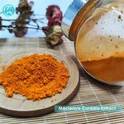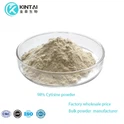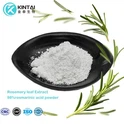Acerola cherry powder is derived from the small, bright red acerola fruit, which is native to tropical and subtropical regions of the Americas. Also known as Barbados cherry or West Indian cherry, acerola has been used for centuries in folk medicine and cuisine. Today, acerola cherry powder is prized for its exceptionally high content of vitamin C, earning it the nickname "the vitamin C powerhouse." In this blog post, we'll explore the nutritional profile of acerola cherries, how the powder is made, traditional uses, and the science behind its many potential health benefits. From boosting immunity to promoting skin health and beyond, let's take a closer look at this antioxidant-rich superfruit powder.
Overview of Acerola Cherry
Acerola cherries have an impressive nutritional profile. Just one cup of raw acerola cherries provides over 1,600% of the recommended daily intake for vitamin C. Aside from being an excellent source of vitamin C, acerola cherries also contain antioxidants like anthocyanins and carotenoids, vitamin A precursors, vitamin B complex, iron, calcium, and fiber.
To make acerola powder, ripe acerola cherries are harvested, cleaned, and dried, either by freeze drying or sun drying methods. The dried cherries are then ground into a fine powder. Compared to fresh cherries, the powdered form is much more concentrated in nutrients and antioxidants. Just one teaspoon of acerola powder may provide over 100% of the daily recommended intake of vitamin C.
Traditionally, acerola cherries were used by indigenous peoples in South America and the Caribbean to treat infections and colds. Cherries were made into teas, juices, or added to dishes. Today, acerola powder is still valued in traditional herbal medicine and has made its way into dietary supplements and functional foods.
High in Vitamin C
One of the biggest health benefits of acerola cherry powder is its exceptionally high vitamin C content. Vitamin C is a powerful antioxidant that supports immune function. It stimulates the production and activity of lymphocytes and phagocytes, white blood cells that target pathogens. Vitamin C also helps make collagen, the main structural protein in connective tissues.
Regularly consuming vitamin C is linked to reduced risk and severity of respiratory infections like the common cold. Multiple studies demonstrate that vitamin C shortens the duration of colds and flu when taken as a supplement. Its antioxidant effects may also help ease allergy symptoms.
Acerola powder's high vitamin C content makes it an excellent option for boosting daily vitamin C intake, especially during cold and flu season. But potential benefits don't stop there – vitamin C is also essential for skin health, cardiovascular function, and more.
Skin Health Benefits
In addition to supporting immunity, the vitamin C in acerola cherry powder helps protect and rejuvenate skin. Vitamin C is required for collagen production and acts as an antioxidant to combat free radicals that damage skin cells. Collagen loss leads to wrinkles and sagging. The vitamin C in acerola powder may help slow these signs of aging.
Some small studies reveal promising results for acerola powder and skin health. In one study, women who took an acerola extract supplement for 16 weeks had significant improvements in facial skin smoothness and self-perceived skin health. The high antioxidant content of acerola powder may also help defend skin against UV radiation and environmental damage. Applying acerola powder topically may enhance these skin-protective effects.
Other Health Applications
While research is still emerging, preliminary studies suggest acerola cherry powder may offer benefits for other aspects of health:
- Cardiovascular health - Acerola's antioxidants help protect cholesterol particles from oxidative damage linked to atherosclerosis. Animal studies also indicate acerola may help lower blood pressure.
- Brain health - Compounds in acerola like vitamin C, anthocyanins, and quercetin may help reduce oxidative damage and neuroinflammation associated with cognitive decline.
- Diabetes - Acerola may help regulate insulin response and manage oxidative stress related to diabetes in animal models.
While these results are promising, human clinical data is limited. More research is needed to confirm effects. But acerola's rich antioxidant content suggests potential in many areas of health.
Dosage and Safety Considerations
There is no established standard dosage for acerola powder. Supplement portions range from 500-1000mg taken on more than one occasion day to day. For high L-ascorbic acid admission, as far as possible is recommended at 2,000mg every day. As a powder, acerola can be mixed into smoothies or juice.
Acerola cherry powder is possible safe for a great many people when utilized suitably. Be that as it may, incidental effects like the runs or agitated stomach might happen with exorbitant admission. The high L-ascorbic acid substance could likewise collaborate with specific drugs like blood thinners. Those on prescription drugs should consult a doctor before using acerola powder supplements.
Due to its impacts on collagen and immunity, acerola supplements are not recommended following surgery or for those with collagen disorders, kidney conditions, or certain autoimmune diseases. As with any supplement, introduce acerola powder gradually to assess tolerance. Discontinue use if any adverse effects develop. Always consult your healthcare provider before adding acerola powder to your routine.
Conclusion
Acerola cherry powder offers a wide exhibit of potential medical advantages, from improving resistance and safeguarding skin to enhancing cardiovascular wellbeing, cerebrum capability, and then some. Acerola powder can be a healthy addition to smoothies, juices, and supplements due to its high vitamin C content and other nutrients and antioxidants. While human exploration is as yet continuous, the underlying discoveries are promising. When utilized fittingly and under the direction of a medical care proficient, acerola cherry powder might give key supplements to help entire body health.
If you are interested in our Levodopa Powder or have any questions, you can contact our email directly. We will have the most professional business personnel to contact you!
Email: sales@kintaibio.com | WhatsApp: 13347436038
References:
1. Troncoso, A.M., Mezadri, T., Villao, D., Fernández-Pachón, M.S., Garca-Parrilla, M.C., and Acerola (Malpighia emarginata DC.) contains antioxidant compounds and exhibits antioxidant activity. leafy foods. Diary of Food Arrangement and Investigation, 21(4), 282-290.
2. Ramful, D., Tarnus, E., Aruoma, O. I., Bourdon, E., and Bahorun, T. (2011). Polyphenol arrangement, L-ascorbic acid substance and cell reinforcement limit of Mauritian citrus natural product pulps. Food Exploration Worldwide, 44(7), 2088-2099.
3. Hanamura, T., Mayama, C., Aoki, H., Hirayama, Y., and Shimizu, M. (2006). Antihyperglycemic impact of polyphenols from acerola (Malpighia emarginata DC.) fruit. Bioscience, Biotechnology, and Natural chemistry, 70(8), 1813-1820.
4. Ströhle, A., and Rohn, S. (2020). L-ascorbic acid. In Sustenance and Immunology (pp. 91-101). Springer, Cham.
5. Hemilä, H., and Chalker, E. (2013). L-ascorbic acid for forestalling and treating the normal virus. Cochrane information base of orderly surveys, (1).
6. J. M. Pullar, A. C. Carr, and M. C. Vissers The Jobs of L-ascorbic acid in Skin Wellbeing. Supplements, 9(8), 866.
7. Uchida, E., Connor, C. J., Sewell, D. A., Wacksman, J., and Connor, J. R. (2016). The impacts of acerola cherry concentrate on facial kinks and flexibility. Diary of restorative dermatology, 15(4), 520-526.
8. Riso, P., Visioli, F., Grande, S., Guarnieri, S., Gardana, C., Simonetti, P., and Porrini, M. (2006). markers of inflammation, immunomodulation, and oxidative stress were affected by a tomato-based beverage. Diary of agrarian and food science, 54(7), 2563-2566.







